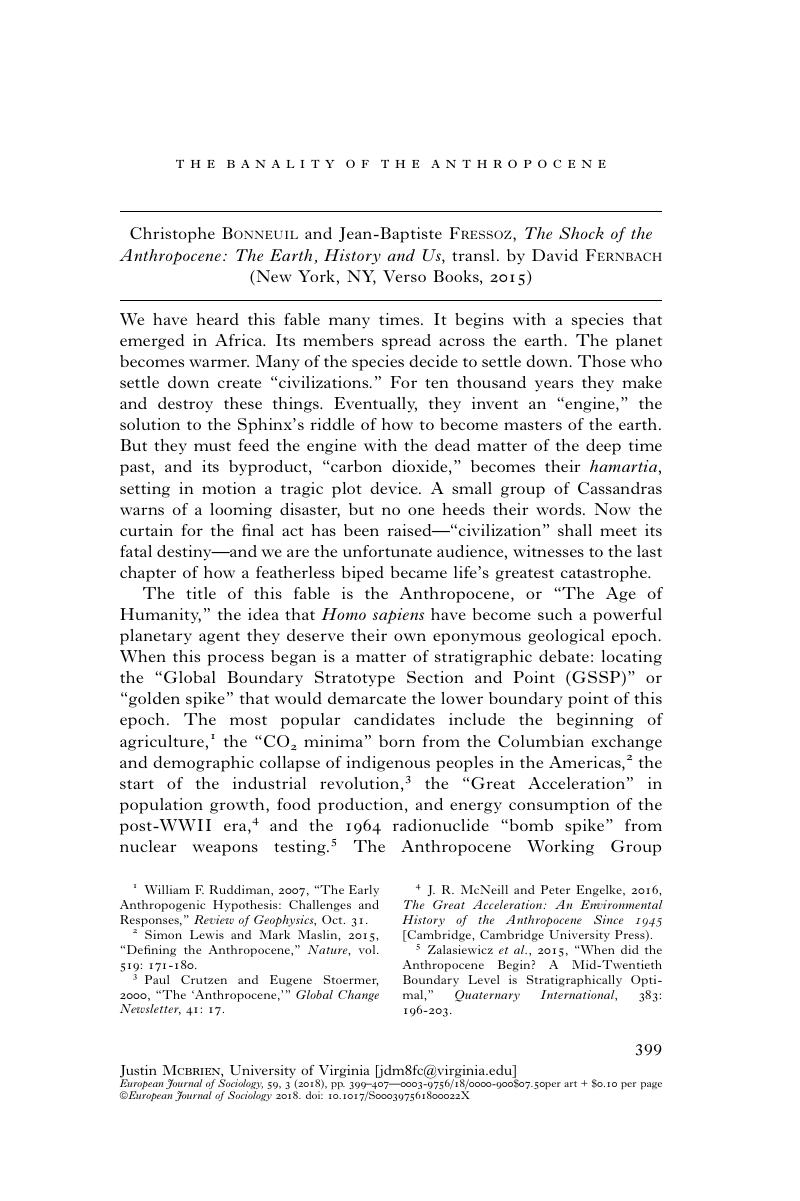No CrossRef data available.
Article contents
The Banality of the Anthropocene - Christophe Bonneuil and Jean-Baptiste Fressoz, The Shock of the Anthropocene: The Earth, History and Us, transl. by David Fernbach (New York, NY, Verso Books, 2015)
Published online by Cambridge University Press: 31 January 2019
Abstract

- Type
- Book Reviews
- Information
- European Journal of Sociology / Archives Européennes de Sociologie , Volume 59 , Issue 3 , December 2018 , pp. 399 - 407
- Copyright
- Copyright © A.E.S. 2018
References
1 William F. Ruddiman, 2007, “The Early Anthropogenic Hypothesis: Challenges and Responses,” Review of Geophysics, Oct. 31.
2 Simon Lewis and Mark Maslin, 2015, “Defining the Anthropocene,” Nature, vol. 519: 171-180.
3 Paul Crutzen and Eugene Stoermer, 2000, “The ‘Anthropocene,’” Global Change Newsletter, 41: 17.
4 J. R. McNeill and Peter Engelke, 2016, The Great Acceleration: An Environmental History of the Anthropocene Since 1945 [Cambridge, Cambridge University Press).
5 Zalasiewicz et al., 2015, “When did the Anthropocene Begin? A Mid-Twentieth Boundary Level is Stratigraphically Optimal,” Quaternary International, 383: 196-203.
6 Colin N. Waters et al., 2016, “The Anthropocene is Functionally and Stratigraphically Distinct from the Holocene,” Science, vol. 351.
7 Jason W. Moore, 2015, Capitalism in the Web of Life: Ecology and the Accumulation of Capital (New York, Verso).
8 Donna Haraway, 2016, Staying with the Trouble: Making Kin in the Chthulucene (Raleigh, NC, Duke University Press).
9 Anna L. Tsing et al., 2015, “Anthropologists Are Talking – About the Anthropocene,” Ethnos, 81 (3): 535-564.
10 Justin McBrien, 2016, “Accumulating Extinction: Planetary Catastrophism in the Necrocene,” in J.W. Moore, Anthropocene or Capitalocene? Nature, History, and the Crisis of Capitalism (Oakland, PM Press: 116-137).
11 Dipesh Chakrabarty, 2009, “The Climate of History: Four Theses,” Critical Inquiry, vol. 35 (2): 197-222.
12 Paul Edwards, 2010, A Vast Machine: Computer Models, Climate Data, and the Politics of Global Warming (Cambridge, MA, MIT Press); James Rodger Fleming, 2010, Fixing the Sky: The Checkered History of Weather and Climate Control (New York, NY, Columbia University Press); Jacob Darwin Hamblin, 2013, Arming Mother Nature: The Birth of Catastrophic Environmentalism (Oxford, UK, Oxford University Press); Naomi Oreskes and Erik Conway, 2014, The Collapse of Western Civilization: A View From the Future (New York, NY, Columbia University Press).
13 Edmund Russell, 2001, War And Nature: Fighting Humans and Insects with Chemicals From WWI to Silent Spring (Cambridge, UK, Cambridge University Press).
14 Moore, 2015, cf. supra.
15 Giovanni Arrighi, 2010, The Long Twentieth Century: Money, Power, and the Origin of Our Times (New York, NY, Verso).
16 Silvia Federici, 2004, Caliban and the Witch: Women, the Body, and Primitive Accumulation (New York, NY, Autonomedia); Maria Mies, (1986) 2014, Patriarchy and Accumulation on a World Scale: Women in the International Division of Labor (London, UK, Zed Books); Achille Mbembe, 2017, Critique of Black Reason, transl. by Laurent Dubois (Raleigh, NC, Duke University).
17 Françoise Vergès, 2017, “Racial Capitalocene,” in G. Johnson and A. Lubin, eds, Futures of Black Radicalism (New York, NY, Verso).
18 Claire Colebrook, 2017, “We Have Always Been Post-Anthropocene,” in R. Grusin, ed., Anthropocene Feminisms (Minneapolis, MN, University of Minnesota Press: 1-20).
19 Kate Raworth, 2014, “Must the Anthropocene Be a Manthropocene?”, The Guardian, Oct. 20 [Last accessed September 17, 2018, https://www.theguardian.com/commentisfree/2014/oct/20/anthropocene-working-group-science-gender-bias].
20 Kyle Whyte, 2017, “Our Ancestor’s Dystopia Now: Indigenous Conservation and the Anthropocene,” in U. Heise, J. Christensen, and M. Niemann, eds, The Routledge Companion to the Environmental Humanities, Routledge: 206-215.


